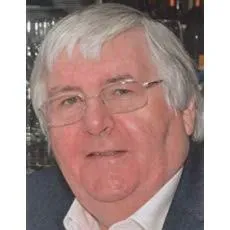06 September 2019
Dennis Wood: A Kind of Portrait
by Richard Lewis (French, 1966-70 & 1971-72)
Dennis Wood died suddenly a year ago, on 25th May 2018, shortly before his seventy-first birthday. He was born in the West Midlands and studied French at King’s (1965-1969), later becoming Emeritus Professor of French Literature at the University of Birmingham, a post he held until his retirement in 2008. This is a sketch of the Dennis Wood I knew at King’s, and then again in later life.


I knew Dennis for a year. Just a year. But a memorably formative one at the beginnings of our university life in the mid 1960s. So memorable indeed that, even though more than three decades would pass in the grand silence of absent friends, it was with perfect ease that, in the 1990s, we picked up where we had left off such a long time before.
To this extent the Dennis I knew was not exactly the Dennis other people knew; not his colleagues and perhaps not even his closest family. Our perception, visualization and memory of someone is always edited by our own personal make-up and circumstances. Uniquely, for me Dennis was the person I explored the world of ideas and literature with at the dawn of life and then again during its maturity. Our discussions, observations and linguistic curiosity were what connected us together at both ends of existence even though we had been silent in the years between.
We met at Halliday Hall, one of the halls of residence belonging to King’s College, at Clapham Common. I was in my first year of my degree course in French. Dennis was in his second, and so a year older and wiser. A third undergraduate doing French in my year, Peter Brown, also from South Wales like me, came my way and the three of us were soon meeting regularly at one or other of our rooms in the residence. It was a comfortable existence, the rooms well appointed, meals taken care of by an adequate refectory and so very conducive to leisure hours of talk, ideas and what we liked to call ‘pleasant conceits’.
Dennis had, of course, acquired far greater erudition than us in French literature and especially in the history of the language. But he was in no way limited to French studies and his inquisitive mind ranged over all aspects of culture, from popular to high, and he could be as fascinated by my cacophonous ‘The Fugs’ First Album’ (sent to me by an American girlfriend with alternative tastes) as he was by my records of Dylan Thomas’ poetry readings.
This was Dennis’ period of intellectual adventure, an adventure in which both I and my new friend Peter were happy to share. Dennis was intrigued by the counter-culture of the 1960s, but, no subversive himself, he always viewed it at a distance and would never let anything as outrageous as psychedelia or substance-taking derail the course of his inner or outer life. He had eccentric friends from his school past in Birmingham, one or two of whom people his novels, and one of whom even visited Halliday Hall complete with priest’s alb and clutching a painting he had done called ‘For The Sins Of Those Cities, O Lord’. But Dennis was no eccentric himself, nor someone who could live on the edge. His year abroad as an assistant at a lycée in Paris at the time of the student uprisings was his big adventure in life. In later years, after retirement, this period would eventually translate itself into some of the accomplished and stylish novels he would write in the new freedom retirement gave him. Dennis had always had a vision of himself as a creative writer and early retirement at sixty was part of his strategy for allowing the spirit inside him to be released into the wild of story-telling, in which elements of his youth and early adulthood were often imaginatively re-cast. Liberated from the constraint of academic focus, he found a wonderful new home in fiction.
But that was much later. Back in 1968 Dennis returned to Halliday Hall for his fourth and final year, just as I left for my own year in Paris. It was a time still animated by the turbulent aftermath of les événements and my own adventure there was every bit as great as Dennis’. But we would never meet to talk about it or swap notes. As I returned, Dennis left, having completed his finals, and, with a First, gone on to post-graduate work at Cambridge. Nor did I see again my friend Peter, who, for both personal and career reasons, had requested not to do a year abroad and had completed his degree a year earlier than me.
In one way or the other, the doors of Halliday Hall closed inexorably behind us. Gone was the cosy intimacy of undergraduate life. We were dispersed.
How exactly did I re-find Dennis so many years later? And when? The truth is that I can no longer remember. It was sometime in the 1990s, perhaps via a website devoted to Latin which interested me and to which Dennis subscribed, though my email record has gone. The furthest my record stretches to is an email of 2002, to which Dennis attached a photo of himself and his wife, Kathy, and his two sons. He wondered if I would recognize him as, in his words, he was about ten stone heavier than he should be. It was hard to release the slender Dennis I had known from the large person in the photo, but his essential face was still very much there.
At first we were in touch sporadically, every couple of years, mainly over the books we had both written and some reminiscences of our student days. Dennis had an encyclopaedic, even Proustian, memory for the smallest details: everything interested him, and everything was remembered. He was a born novelist. Then, after these intermittences, in 2013 we began to correspond in earnest, more regularly and at greater length. Into these new discussions, which in a sense really were searches for lost time, we managed to draw in our old friend Peter Brown, who had kept in touch with Dennis over the years through amply annotated yearly Christmas cards. The emails became a string, a kind of triangulation in which we took turns to range over the things that interested us. Nothing was excluded, from teenage love to Chekhov.
Until, at last, we came to Dennis’ last email, written just four days before his fatal heart attack. Fittingly, he included in it the entire text of Auden’s ‘As I Walked Out One Evening’, which he had first taped in Halliday Hall from my record of Dylan Thomas’ reading of the poem. His comment was: ‘If there’s a poem that’s been constantly with me all my life it’s that Auden one, Richard. I taped your recording of Dylan Thomas, and Kathy and I often quote from it.’ Of course, it was especially important for Dennis as it was set in Birmingham - indeed it was Dennis who first explained to me that the Bristol Street of the opening stanza was a street in Birmingham. And so our communication ended with that great poem, which today takes on an even greater poignancy for me.
The clocks had ceased their chiming,
And the deep river ran on.
